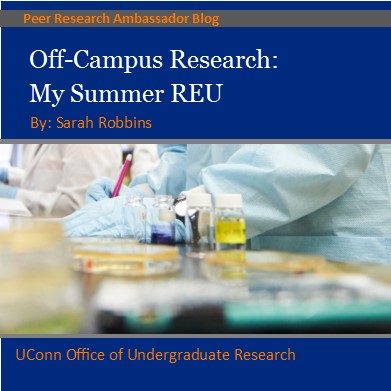By: Sarah Robbins, OUR Peer Research Ambassador
The research I do at UConn is both fulfilling and exciting, but I highly recommend undergraduates consider participating in outside research opportunities during the summer. Off-campus research experiences can help to expand how you think about the research process and can provide you with an in depth look at graduate school.
I found my summer research experience through the NSF REU program. For those not up on the acronyms, this is a program run by the National Science Foundation (NSF) that provides Research Experiences for Undergraduates (REU’s). People familiar with the program typically just refer to these as REU’s. You can find a link to the REU database (and many other databases with off-campus research opportunities!) on the OUR website.
After filling out applications and putting together personal and research statements, I was accepted into the SURF program at The Scripps Research Institute (TSRI) in Jupiter, Florida, which is a non-profit private research institute. I participated in their program in the summer between my junior and senior year.
This experience became one of the greatest summers of my life, not to mention I was able to live in a new place! I learned more than I could have ever imagined about conducting immunological experiments and building networking connections. I worked closely with graduate students and post docs in Dr. Matthew Pipkin’s CD8+ T cell immunology laboratory. My work focused on looking at specific transcription factors that regulate the differentiation of CD8+ T cells into short-lived effector cells and memory precursor effector cells upon acute viral infection, as well as producing select CD8+ T cells from hemopoietic stem cell cultures.
A major area of focus during this internship was networking, whether that be with your fellow interns, grad students, post docs, administrators or PIs. The conversations I had with these experienced scientists were life changing, they really understand the future of their research areas and have great advice for what to look at when applying to graduate school. It is important to become acquainted with the graduate students because often PIs look for their recommendation when accepting new students. The post docs have a great deal to share about their experience in graduate school, as well careers in their field. Throughout the summer I met with my PI on a weekly basis to share my progress and get his feedback, as well as build a personal connection. The program had many intern seminars and an end of the summer poster presentation where you got the opportunity to speak with PIs from a variety of fields. I recommend obtaining an experience in a private research institute setting, it’s very different from a typical university and can therefore introduce new perspectives when considering future careers.
The other major component of this opportunity was the social aspect. The science loving interns were from all over the country, with diverse research interests and back grounds. We lived (in a super nice hotel), ate and traveled together. By the end of the summer we were all really close and constantly went on weekend trips to Juno beach, downtown West Palm, Universal Studios, Miami and so much more. TSRI put together a lot of fun intern activities including barbecues and a paddle boarding trip on the intercoastal. You also really get to know the people in your lab, I personally enjoyed lab lunches/dinners and Game of Thrones nights.
I recommend off-campus REUs to everyone, I will always remember my experiences at TSRI, especially the friends and connections I have made!
Sarah Robbins is a senior double majoring in Pathobiology and Molecular and Cell Biology. Click here to learn more about Sarah.